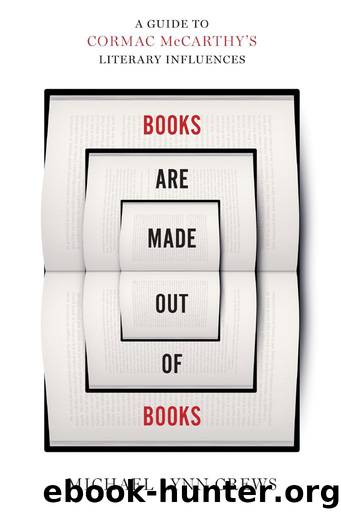Books Are Made Out of Books: A Guide to Cormac McCarthy's Literary Influences by Michael Lynn Crews

Author:Michael Lynn Crews [Crews, Michael Lynn]
Language: eng
Format: epub
Publisher: University of Texas Press
Published: 2017-09-04T22:00:00+00:00
Dillard, Annie (b. 1945)
A holograph reference to the medievalist and novelist Dorothy Dunnett that appears in McCarthy’s notes for Blood Meridian is more likely a reference to a Dunnett quotation that appears in Annie Dillard’s Pilgrim at Tinker Creek, first published in 1974. The note reads: “Dorothy Dunnet [sic] (no clear reply)” (Box 35, Folder 4). I have not been able to locate the quotation in Dunnett’s work, most of which is historical fiction. However, two things suggest that McCarthy got it from Dillard rather than Dunnett: the nature writing genre, in which Annie Dillard is widely regarded one of the luminaries, is one to which McCarthy is strongly drawn (his notes and drafts contain references to Aldo Leopold, Henry Beston, Joseph Wood Krutch, Edward Abbey, and Barry Lopez), and the quotation appears in the context of a theological discussion that resonates with McCarthy’s own interests in mysticism.
The Dillard passage in which the quotation appears begins with a humorous reflection on mountaintop mysticism: “I have never understood why so many mystics of all creeds experience the presence of God on mountaintops. Aren’t they afraid of being blown away? . . . For if God is in one sense the igniter, a fireball that spins over the ground of continents, God is also in another sense the destroyer, lightning, blind power, impartial as the atmosphere” (89). Dillard goes on to contemplate this dark vision of God, the fearful element in the fear of the Lord. I have highlighted the words that McCarthy quoted (with a slight inaccuracy): “In the open, anything might happen. Dorothy Dunnett, the great medievalist, states categorically: ‘There is no reply, in clear terrain, to an archer in cover.’ Any copperhead anywhere is an archer in cover; how much more so is God! Invisibility is the all-time great ‘cover’; and that the one infinite power deals so extravagantly and unfathomably in death—death morning, noon, and night, all manner of death—makes that power an archer, there is no getting around it” (89–90, emphasis added).
This vision of the divine nature as ambiguously contained between the poles of life and death is in accord with McCarthy’s own forays into theological speculation in his fiction. For instance, in The Crossing, the wisdom figure Don Arnulfo tells Billy that he should “find that place where acts of God and those of man are of a piece. Where they cannot be distinguished” (47). Arnulfo explains in Spanish that these are places where the iron is already in the earth, places where the fire has already burned (47). He concludes this lesson—obscurum per obscurius—with the following: “He said that it was at such places that God sits and conspires in the destruction of that which he has been at such pains to create” (47). This sentiment resonates with Dillard’s vision of God as both creator and destroyer.
If Dillard, rather than Dunnett, was McCarthy’s source, this would lend credence to my suspicions about another instance of Dillard’s influence on McCarthy. In her 1982 book Teaching a
Download
This site does not store any files on its server. We only index and link to content provided by other sites. Please contact the content providers to delete copyright contents if any and email us, we'll remove relevant links or contents immediately.
| African | Asian |
| Australian & Oceanian | Canadian |
| Caribbean & Latin American | European |
| Jewish | Middle Eastern |
| Russian | United States |
4 3 2 1: A Novel by Paul Auster(12392)
The handmaid's tale by Margaret Atwood(7763)
Giovanni's Room by James Baldwin(7346)
Asking the Right Questions: A Guide to Critical Thinking by M. Neil Browne & Stuart M. Keeley(5775)
Big Magic: Creative Living Beyond Fear by Elizabeth Gilbert(5771)
Ego Is the Enemy by Ryan Holiday(5447)
The Body: A Guide for Occupants by Bill Bryson(5096)
On Writing A Memoir of the Craft by Stephen King(4943)
Ken Follett - World without end by Ken Follett(4731)
Adulting by Kelly Williams Brown(4574)
Bluets by Maggie Nelson(4556)
Eat That Frog! by Brian Tracy(4540)
Guilty Pleasures by Laurell K Hamilton(4448)
The Poetry of Pablo Neruda by Pablo Neruda(4106)
Alive: The Story of the Andes Survivors by Piers Paul Read(4031)
White Noise - A Novel by Don DeLillo(4009)
Fingerprints of the Gods by Graham Hancock(4004)
The Book of Joy by Dalai Lama(3986)
The Bookshop by Penelope Fitzgerald(3852)
